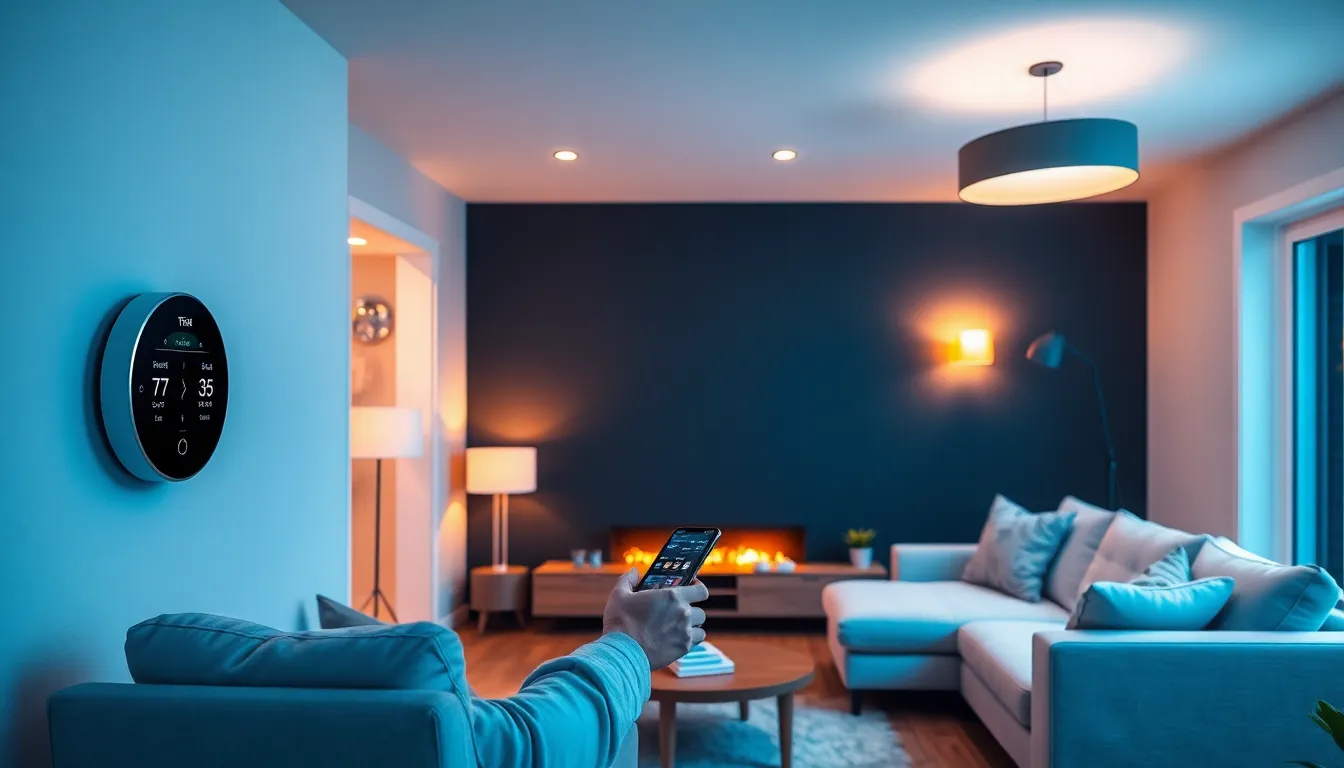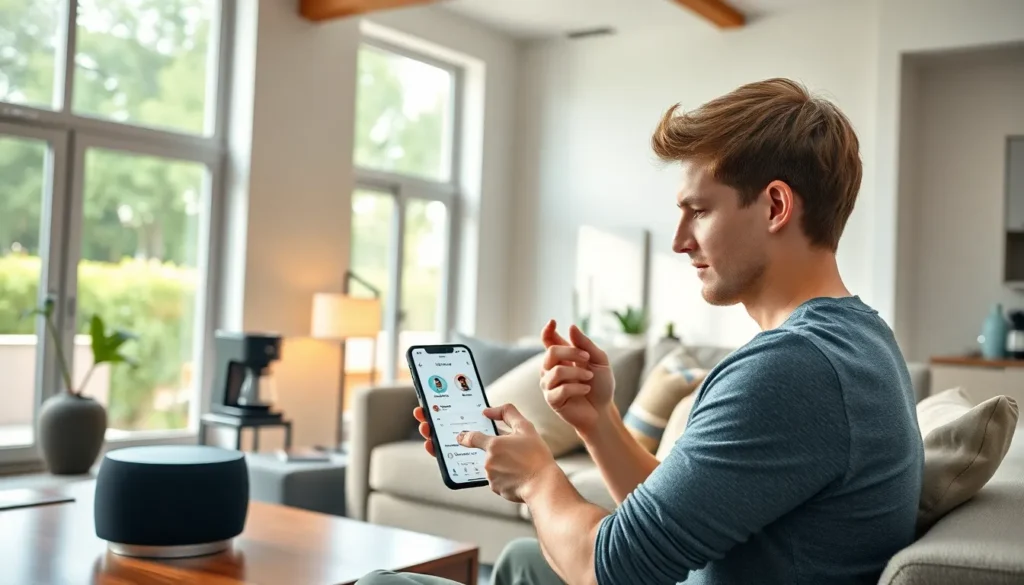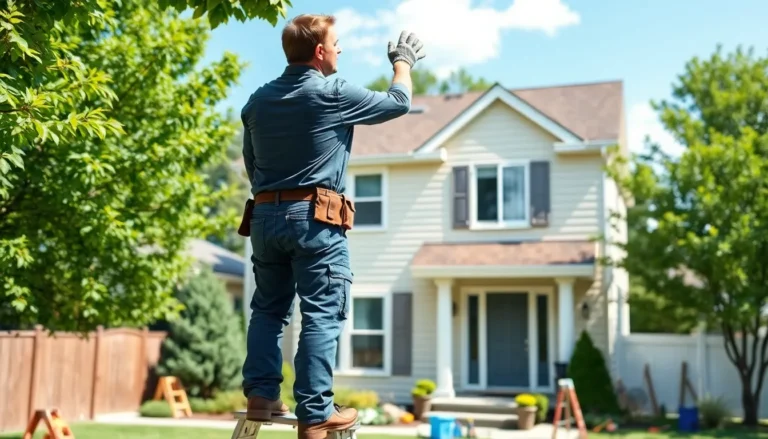Imagine waking up to the gentle hum of your coffee maker brewing your favorite blend while the lights gradually brighten to mimic a sunrise. Welcome to the world of smart homes, where convenience meets innovation. With a few taps on a smartphone, everyday tasks transform from mundane to magical, making life not just easier but also a bit more fun.
Table of Contents
ToggleBenefits Of Smart Home Technology
Smart home technology transforms everyday living by integrating automation and control into daily tasks. Numerous advantages accompany these innovations, enhancing comfort and security.
Enhanced Convenience
Smart homes prioritize user comfort through automation. Automated thermostats adjust temperatures based on specific schedules, ensuring a pleasant environment at all times. Voice-activated assistants streamline activities; they allow users to control lights, appliances, or music hands-free. Smart appliances communicate, enabling users to monitor appliances remotely, complete tasks like laundry, or even receive alerts when a dish finishes cooking. Cloud-based services offer access to these systems from anywhere, ensuring control remains at one’s fingertips. Investing in smart home technology not only simplifies daily routines but also fosters a seamless lifestyle.
Increased Security
Security is a top priority for smart home technology. Smart cameras monitor activity in and around homes, providing real-time footage through mobile devices. Intruder alerts notify homeowners of potential threats immediately, enhancing peace of mind. Smart locks eliminate the hassle of traditional keys; they enable remote locking or unlocking and allow guests access without physical keys. Integration with alarm systems offers full-house monitoring, with notifications for unusual circumstances. These features create a safer living environment, helping homeowners protect their families and belongings effectively.
Energy Efficiency And Cost Savings

Smart home technology significantly enhances energy efficiency, leading to substantial cost savings for homeowners. This efficiency arises from automated systems that optimize energy usage according to specific needs.
Smart Thermostats
Smart thermostats intelligently regulate heating and cooling systems. These devices analyze patterns in usage and adjust temperatures accordingly. For example, they can lower energy consumption during times when homes are unoccupied, resulting in noticeable savings on energy bills. The Energy Star program notes that households using smart thermostats can save up to 10-15% on heating and cooling costs annually. Features like remote access and scheduling further enhance their ability to maintain energy efficiency.
Smart Lighting Systems
Smart lighting systems provide optimal control over home illumination. Users can create schedules, adjust brightness, and select colors, all remotely via apps. Such flexibility reduces energy usage by ensuring lights are only on when needed. Reports indicate that smart lighting can lead to savings of around 20-40% on energy consumption compared to traditional lighting. Automated sensors help to turn lights off when rooms are vacant, promoting further efficiency.
Improved Home Management
Smart home technology enhances home management through efficient monitoring and automation. Homeowners can easily manage various aspects of their environment with connected devices.
Remote Monitoring
Devices like smart cameras and sensors provide real-time updates. Homeowners access video feeds and data remotely using smartphones or tablets. This feature allows them to monitor their homes while away, increasing peace of mind. Notifications alert individuals to unusual activities, ensuring safety. A study revealed that homes with smart security systems experience 25% fewer burglaries. Remote monitoring greatly enhances security and convenience, making it a popular choice.
Automation Routines
Smart home automation streamlines daily tasks and routines. Homeowners set up routines for devices to perform specific actions at designated times. For example, a morning routine might include adjusting the thermostat, turning on lights, and brewing coffee automatically. Many devices sync with calendars, providing flexibility in managing schedules. According to research, 70% of users find automation routines save them at least an hour each week. Embracing automation simplifies tasks, creating a more efficient lifestyle.
Customization And Scalability
Smart home technology allows significant customization and scalability. Homeowners can tailor their setups based on unique preferences and lifestyles. Users can select specific devices to create personalized experiences. For instance, one homeowner might choose smart lighting that can adjust color temperature, enhancing their productivity. Another may opt for a comprehensive security system with smart locks and cameras, addressing their safety concerns.
Scalability plays a crucial role in smart home setups. Owners can start with a few devices and expand gradually. For example, they might initially implement a smart thermostat. Later, adding smart speakers or additional security cameras becomes an easy task. This flexibility makes smart homes suitable for various household sizes and requirements.
Integrating smart home technologies fosters seamless communication among devices. Homeowners often discover compatibility options that enhance automation. Combining devices from different brands typically results in a cohesive smart home ecosystem. For instance, linking voice assistants with smart appliances allows users to control their home via simple commands.
Customization options extend to energy management as well. Smart thermostats can learn preferences over time, adapting their schedules automatically. Studies show that homes utilizing these systems see energy savings of 10-15% on annual utility bills. Consequently, homeowners enjoy both convenience and cost-efficiency.
Investing in smart home technology ensures ongoing adaptability. As individual needs evolve, homeowners can adjust their systems without major overhauls. Future advancements in smart home tech also enable users to stay current with the latest innovations. Thus, the combination of customization and scalability positions smart homes as an appealing solution for modern living.
Smart home technology significantly enhances everyday living by providing convenience security and energy efficiency. With automated systems homeowners can streamline daily tasks while enjoying a safer environment. The ability to customize and scale smart home setups allows individuals to create tailored experiences that fit their unique lifestyles.
As technology continues to evolve smart homes will become even more integral to modern life. Embracing these innovations not only simplifies routines but also contributes to a more sustainable future. For those looking to improve their home environment investing in smart technology is a step toward a more comfortable and efficient living space.




